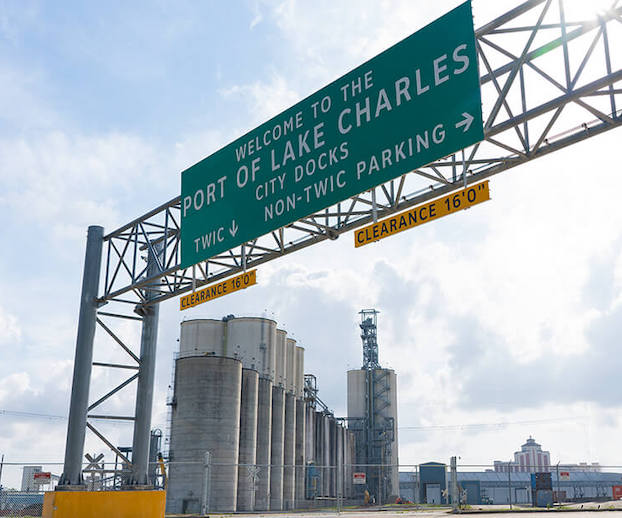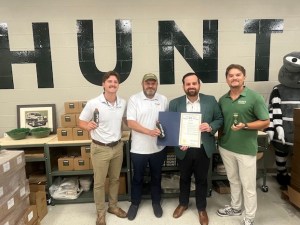$124M ruling against Port of LC vacated
Published 4:11 pm Thursday, August 1, 2024
A $124 million judgment against the Port of Lake Charles has been vacated after a federal judge failed to reveal her longstanding personal relationship with the lead counsel who represented a commercial tenant suing the Lake Charles Harbor and Terminal District.
U.S. District Court Magistrate Judge Kathleen Kay previously ruled the Lake Charles Harbor and Terminal District owed Infrastructure Funding Group Port Holdings $124,531,652 in damages because of a breach of contract.
A letter of intent executed in 2008 by IFG and the port stated IFG wanted to “develop an export grain terminal that would use Berth 8 located at the port’s City Docks for loading ships for export.” Under the contract with the port and IFG, the port had to secure appropriate permitting through the U.S. Army Corps of Engineers and “proper assurance of slope stability along the proposed dredging area.”
Trending
IFG filed suit against the port in late January 2016, claiming the port did not make certain Contraband Bayou was ready to be dredged to the desired depth before the $50 million export terminal was operational.
Originally U.S. District Judge Patricia Minaldi was set to hear the case, but she took leave of absence from the bench in 2017. During an April 15, 2016, conference, both parties were told if they wanted the case heard sooner, the case would need to be referred to Kay’s courtroom. Kay disclosed at the time that IFG’s lead counsel, William B. Monk, was the father of her law clerk, but the clerk “would be walled off the case.”
Kay would later rule in late July 2020 the port was “liable to IFG for losses attributable to IFG’s inability to market itself as a fully operational terminal and to load larger, deeper draft cargo vessels as was intended by its original business plan.” The ruling also stated that IFG “suffered ascertainable loss of money as a result of the port’s use of unfair and deceptive methods, acts and practices.”
The Port of Lake Charles appealed the decision and on July 26, the United States District Court for the Eastern District of Texas vacated Kay’s ruling, citing Kay’s longstanding personal relationship with Monk. In addition to Monk’s daughter serving as Kay’s law clerk, Monk also served as a groomsman in Kay’s wedding, Kay officiated the wedding of another one of Monk’s other daughters, Kay is childhood friends with Monk’s wife, and the sons of both Kay and the Monk family are close friends who camp, golf and have gone on a family vacation together.
The Port claims Kay made no disclosures to the parties at the 2016 conference or at any other point in the litigation of how close her relationship is to the Monk family. The extent of the relationship was not discovered until after Kay made her ruling, the port claimed.
In its appeal, the port cited not only Kay’s relationship to Monk but “an unforgettable level of abuse” port counsel Mike Dees experienced during the trial. In an email, he described it as “one of his worst trial experiences in 40 years and testified that he experienced an unforgettable level of abuse from Judge Kay when he was on the witness stand because of her eye-rolling, volume and facial expressions.” Port co-counsel Matt Mize testified Kay seemed mad at Dees during the trial for reasons he did not understand.
Trending
In its ruling the United States District Court for the Eastern District of Texas said that based on trial transcripts, Kay seemed “frustrated by the pace of the trial and with Port counsel.”
“Throughout the trial, Judge Kay challenged Port counsel and witnesses about their questions, tactics, and testimony, including openly criticizing the Port’s operations and attorneys at times,” Judge Michael Truncale wrote in the ruling. “While there were certainly moments of humor and levity, her demeanor toward the Port was often short and dismissive.”
The court found that because the port did not have knowledge of the relationship between Kay and Monk when it consented to have her hear the case, the port “lacked crucial information” and court must vacate Kay’s ruling.
“Given the duration and closeness of the relationship between Judge Kay, Monk, and their families, the court holds that Judge Kay and Monk’s nondisclosure of that relationship reasonably casts doubt on the validity of the Port’s consent to Judge Kay,” Truncale wrote. “Although friendships among judges and lawyers may be common, particularly in small communities like Lake Charles, there is a difference between a collegial professional relationship and a truly close friendship that involves family members, goes beyond work, and spans decades. This factor therefore also weighs in favor of vacating the referral.”
Truncale also wrote that Kay’s “large $124 million damage award to Monk’s client undoubtedly raises questions regarding the justice and fairness of these proceedings.”







